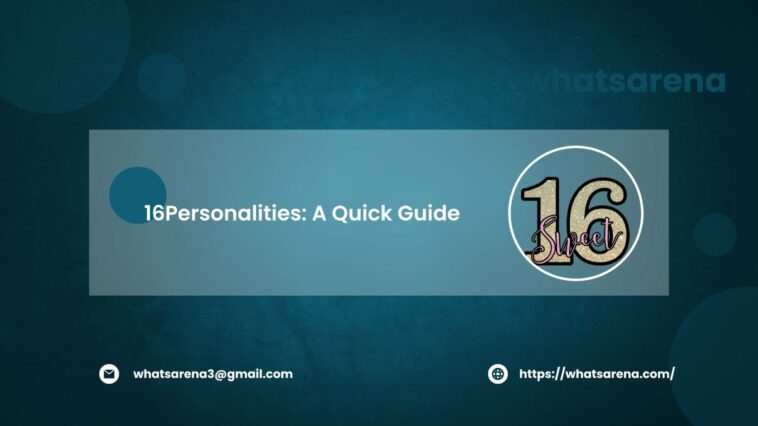Understanding oneself is central to investigating the complexities of present-day life, from mindfulness to livelihood organizing. One of the most well-known instruments utilized for self-disclosure is the 16Personalities structure, which depends on the Myers-Briggs Type Marker (MBTI) and draws from Carl Jung’s speculations on mental sorts. This model orders individuals into 16 particular character types, offering experiences into their assets, shortcomings, and inclinations.
Table of Contents
- Introduction to the 16Personalities Model
- The Four Dichotomies Explained
- Overview of the 16 Personality Types
- How to Determine Your Personality Type
- Applying Personality Insights for Self-Improvement
- Leveraging the 16Personalities in Career Development
- Working on Relational Connections Through Self-Information
- Down to earth Tips for Regular Use
- Conclusion
Introduction to the 16Personalities Model
The 16Personalities model is a famous character structure that develops Carl Jung’s mental hypotheses, refined by Isabel Briggs Myers and Katharine Cook Briggs. It orders characters into 16 kinds in light of four divisions. These sorts act as a guide for self-awareness, assisting people with acquiring a more profound comprehension of how they see the world and move toward difficulties. Understanding one’s character type can give significant experiences into regular tendencies in different regions, like work, connections, and direction.
This system has acquired huge ubiquity because of its openness and significance, permitting people to participate in a course of self-disclosure that resounds with their encounters and sentiments. The 16Personalities system offers a potential chance to investigate oneself in an organized manner, making it simpler to consider self-improvement and associations with others.
The Four Dichotomies Explained
The 16Personalities types originate from blends of four arrangements of inclinations, known as divisions:
Extraversion (E) Self interruption (I)
- Extraversion (E): Favors social collaboration and outer feeling. Extraverts flourish in social scenes and frequently feel stimulated by communicating with others.
- Contemplation (I): Draws energy from isolation and interior reflection. Self-observers will generally favor calm conditions and may demand alone investment to re-energize.
Sensing (S) – Intuition (N)
- Detecting (S): Spotlights on substantial subtleties and down to earth data. Sensors are grounded truly and really like to depend on what they can see and experience.
- Instinct (N): Likes to investigate potential outcomes and the master plan. Intuitives are more conceptual, frequently looking past the surface to grasp hidden designs.
Thinking (T) – Feeling (F)
- Thinking (T): Pursues choices in light of rationale and objective rules. Thinkers prioritize rational analysis and are often more detached in their decision-making.
- Feeling (F): Considers personal values and emotions when making choices. Feelers emphasize empathy and the impact of decisions on others.
Judging (J) – Perceiving (P)
- Judging (J): Prefers structure and organization in life. Judgers appreciate schedules and planning, often feeling more comfortable with clear guidelines.
- Perceiving (P): Tends to be more spontaneous and open to new experiences. Perceivers enjoy flexibility and adaptability, often resisting rigid structures.
Overview of the 16 Personality Types
Every character type is a blend of one inclination from every polarity. Here is a point-by-point outline of the 16 character types, their monikers, key qualities, and popular models:
| Type | Nickname | Key Traits | Famous Examples |
| ISTJ | The Inspector | Practical, logical, detail-oriented, and reliable. | George and Washington Angela Merkel |
| ISFJ | The Protector | Warm, compassionate dependable and supportive. | Mother Teresa, Rosa Parks |
| INFJ | The Advocate | Idealistic insightful empathetic and principled. | Nelson Mandela, Oprah Winfrey |
| INTJ | The Architect | Still up in the air, and imaginative. | Elon Musk, Hillary Clinton |
| ISTP | The Virtuoso | Versatile, clever, logical, and inquisitive. | Amelia Earhart, Bruce Lee |
| ISFP | The Artist | Imaginative, unique, delicate, and receptive. | Sway Dylan, Frida Kahlo |
| INFP | The Mediator | Hopeful, merciful, smart, and inventive. | J.R.R. Tolkien, William Shakesp |
| INTP | The Thinker | Analytical logical curious and independent. | Albert Einstein, Charles Darwin |
Key Traits and Characteristics

Understanding these character types is urgent as it permits people to perceive their assets and shortcomings. For instance:
- Practicality: ISTJs excel in environments that require careful planning and execution, making them great at managing projects.
- Empathy: ISFJs and ENFJs often take on caregiver roles, as their compassion drives them to support others.
- Innovation: INTJs and ENTPs are natural problem-solvers, often generating creative solutions in complex scenarios.
How to Determine Your Personality Type
Finding your personality type is straightforward, thanks to online tests based on the 16Personalities framework. These tests commonly incorporate inquiries concerning your inclinations, ways of behaving, and dynamic styles. The outcomes give an itemized portrayal of your character type, alongside experiences into how you communicate with others, what propels you, and how you could respond in various circumstances.
Steps to Take the Personality Test
- Find a Reliable Test: Search for legitimate sites that offer the 16Personalities test, for example, 16personalities.com.
- Answer Honestly: Answer the inquiries honestly to come by the most reliable outcomes. There are no set-in-stone responses.
- Review Your Results: When you complete the test, you will get a point-by-point report on your character type, including qualities, shortcomings, and ideas for self-awareness.
It is fundamental to recollect that these tests are devices for mindfulness, not authoritative names. They give a system to understanding yourself better, yet self-improvement is a persistent excursion.
Applying Personality Insights for Self-Improvement
When you distinguish your character type, you can utilize this information to improve different parts of your life:
Self-Assessment
Consider what your character type means for your activities, contemplations, and connections. This mindfulness can assist you with recognizing regions for development or changes. For example, on the off chance that you are an INTJ, perceiving your inclination toward hairsplitting can assist you with offsetting your elevated requirements with the requirement for adaptability.
Goal Setting
Put forth objectives that line up with your regular inclinations, improving the probability of inspiration and achievement. For instance, assuming you are an ESFP, you might flourish in powerful conditions, so search out projects that consider imagination and immediacy.
Stress Management
Perceive how you answer pressure and foster survival methods that fit your character type. For instance, contemplative people might profit from planned alone time during occupied periods, while extroverts might have to connect socially to re-energize.
Leveraging the 16Personalities in Career Development
Understanding your character type can direct your professional decisions by featuring jobs in which you are probably going to flourish. Numerous associations additionally use character evaluations to further develop group elements and allocate jobs that match workers’ assets.



